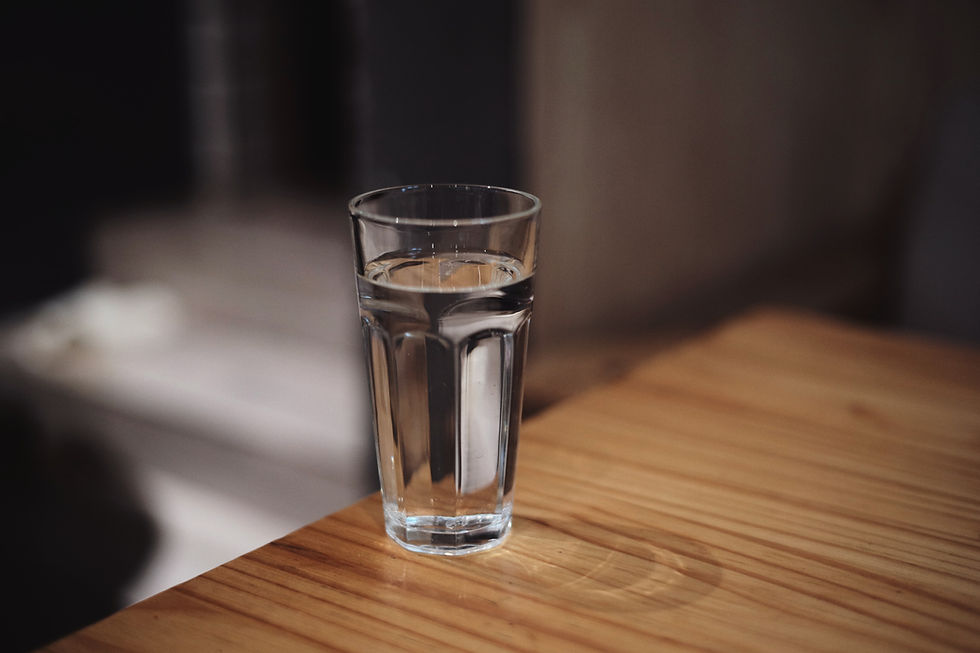Hydration: An Essential Component of Health
- georgiaspencenutri
- Aug 7, 2024
- 3 min read
Guest post written by Haley Bell RNutr on behalf of Georgia Spence Nutrition.

(full image credits to UnSplash)
Water is essential to our health, therefore its important we stay hydrated and be aware when our fluid intake requirements may change, for example in a warmer climate.
What is hydration?
Hydration is the process of replenishing fluids and maintaining the right amount of water in the body for optimal function. Throughout the day you lose fluid via sweating, going to the toilet and breathing, and you gain fluid by drinking water and beverages as well as consuming foods with a high water content and as a by-product from metabolism.
Why is hydration important?
Essential to life, water forms around 60% of the human body and plays a variety of roles[1-3], for example:
· regulates body temperature via perspiration
· aids bowel movements, helping prevent constipation
· transports oxygen and nutrients to cells
· provides a medium for metabolic reactions
· helps maintain blood pressure
· helps the kidneys remove waste and toxins
· lubricates joints to keep them mobile
How much fluid do you need?
This will vary, person to person, along with your physical activity levels and the climate you are in. As a starting point, the UK Eatwell Guide recommends 6-8 cups/glasses of fluid per day[4], and includes water in addition to lower-fat milk (including plant-based milk), sugar-free drinks, tea and coffee. It’s important to note that while caffeine is a mild diuretic, the fluid from a cup of tea or coffee outweighs the mild dehydrating effect of caffeine, and overall fluids levels in the body are improved.
Let’s not forget about how food can contribute to fluid levels, many fruits and vegetables contain over 90% water such as courgettes, cucumbers, lettuce, melon, spinach and tomatoes.
Important to note that alcohol does not count towards fluid intake, due to its diuretic effects, it makes you urinate more than usual.
A good indicator to test your hydration is to look at the colour of your urine. Darker colour urine indicates that your body needs more fluid whereas pale straw-coloured urine is a marker of good hydration[2].
What are the signs of dehydration?
Dehydration occurs when your body is losing more fluids than you are consuming. It can be serious if left untreated.
The NHS notes the following symptoms in adults and children[5]:
· feeling thirsty
· dark yellow, strong-smelling pee
· peeing less often than usual
· feeling dizzy or lightheaded
· feeling tired
· a dry mouth, lips and tongue
· sunken eyes
If you are finding it hard to drink, start with taking small sips of a drink you like and then gradually drink more.
What about vulnerable groups?
Some groups, such as older adults are more susceptible to dehydration[6], a quarter of homecare patients that are admitted to hospital are dehydrated and that’s thought to be an underestimate[7] . The risk of dehydration in older adults increases with:
· swallowing difficulties
· lack of assistance with drinking
· having diarrhoea/vomiting
· having a high temperature
Important to note that urine colour is not a reliable sign of dehydration in older adults!
Older adults do not feel the sensation of thirst the way they use to and therefore the focus should be on incorporating drinking fluids into the daily routine, for example, when taking medication have a full glass of fluid.
Practical tips for staying on top of fluid intake
· drink throughout the day and do not wait until you are thirsty before having a drink
· carry a reusable water bottle to make drinking water more convenient
· make your drink exciting with fresh fruit, for example berries or lemon
· make it part of your routine, for example having a glass first thing in the morning
· set reminders on your phone to have a drink
References
1. NHS. (2023). Water, drinks and hydration. Available at: https://www.nhs.uk/live-well/eat-well/food-guidelines-and-food-labels/water-drinks-nutrition/
2. BDA. (2019). The importance of hydration. Available at: https://www.bda.uk.com/resource/the-importance-of-hydration.html
3. BNF. (2023). Hydration. Available at: https://www.nutrition.org.uk/nutritional-information/hydration/
4. PHE. (2018). The Eatwell Guide. Available at: https://assets.publishing.service.gov.uk/media/5ba8a50540f0b605084c9501/Eatwell_Guide_booklet_2018v4.pdf
5. NHS. (2022). Dehydration. Available at: https://www.nhs.uk/conditions/dehydration/
6. BDA. (2022). Hydration in older adults. Available at: https://www.bda.uk.com/resource/hydration-in-older-adults.html
7. ILC-UK. (2014). Hydration and Older People in the UK: Addressing the Problem, Understanding the Solutions. Available at: https://ilcuk.org.uk/wp-content/uploads/2018/10/Hydration-and-older-people-in-the-UK-2.pdf




Comments